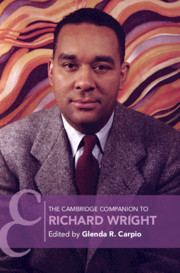Description
The Cambridge Companion to Richard Wright
Cambridge Companions to Literature Series
Coordinator: Carpio Glenda R.
Shows Wright's art was intrinsic to his politics, grounding his exploration of the intersections between race, gender, and class.
Language: English
The Cambridge Companion to Richard Wright
Publication date: 02-2019
280 p. · Hardback
Publication date: 02-2019
280 p. · Hardback
The Cambridge Companion to Richard Wright
Publication date: 03-2019
264 p. · 15.1x22.8 cm · Paperback
Publication date: 03-2019
264 p. · 15.1x22.8 cm · Paperback
Description
/li>Contents
/li>Biography
/li>
Hailed as 'the father of black literature in the twentieth century', Richard Wright was an iconoclast, an intellectual of towering stature, whose multidisciplinary erudition rivals only that of W. E. B. Du Bois. This collection captures Wright's immense power, which has made him a beacon for writers across decades, from the civil rights era to today. Individual essays examine Wright's art as central to his intellectual life and shed new light on his classic texts - Native Son and Black Boy. Other essays turn to his short fiction, and non-fiction as well as his lesser-known work in journalism and poetry, paying particular attention to manuscripts in Wright's archive - unpublished letters and novels, plans for multivolume works - that allow us to see the depth and expansiveness of his aesthetic and political vision. Exploring how Wright's expatriation to France facilitated a broadening of this vision, contributors challenge the idea that expatriation led to Wright's artistic decline.
Introduction: Richard Wright's art and politics Glenda R. Carpio; Part I. Native Son in Jim Crow America: 1. The literary ecology of Native Son and Black Boy George Hutchinson; 2. Richard Wright's planned incongruity: Black Boy as modern living Jay Garcia; 3. Marxism, communism, and Richard Wright's depression-era work Nathaniel F. Mills; 4. Rhythms of race in Richard Wright's 'Big Boy Leaves Home' Robert B. Stepto; 5. Sincere art and honest science: Richard Wright and the Chicago School of Sociology Gene Andrew Jarrett; 6. Outside joke: humorlessness and masculinity in Richard Wright Kathryn S. Roberts; Part II. I Choose Exile: Wright Abroad: 7. Freedom in a godless and unhappy world: Wright as outsider Tommie Shelby; 8. Richard Wright, Paris Noir, and transatlantic networks: a book history perspective Laurence Cossu-Beaumont; 9. Expatriation in Wright's late fiction Alice Mikal Craven; 10. Richard Wright's globalism Nicholas T. Rinehart; 11. Richard Wright's transnationalism and his unwritten Magnus Opus Stephan Kuhl; 12. Tenderness in early Richard Wright Ernest Julius Mitchell.
Glenda R. Carpio is Professor of African and African American Studies and English at Harvard University, Massachusetts. She is the author of Laughing Fit to Kill: Black Humor in the Fictions of Slavery (2008). She coedited African American Literary Studies: New Texts, New Approaches, New Challenges (2011) with Professor Werner Sollors and is currently at work on a book tentatively titled Migrant Aesthetics, a study of contemporary immigrant fiction.
© 2024 LAVOISIER S.A.S.
These books may interest you

Richard Wright in Context 109.04 €




